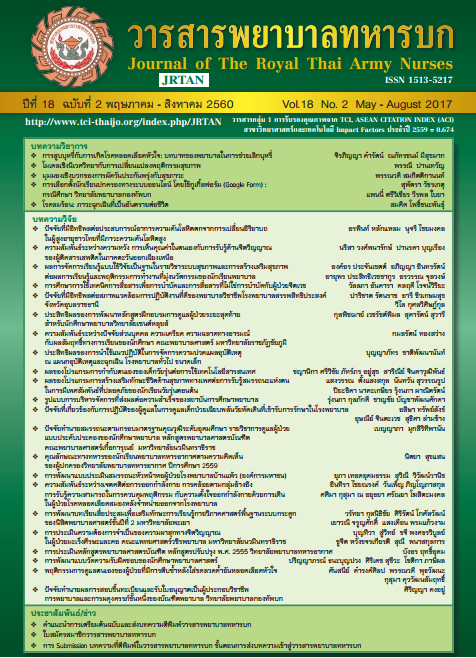ผลของโปรแกรมการสร้างเสริมทักษะชีวิตด้านสุขภาพทางเพศ ต่อการรับรู้สมรรถนะแห่งตนในการมีเพศสัมพันธ์ที่ปลอดภัย ของนักเรียนวัยรุ่นตอนต้น
Keywords:
โปรแกรมสร้างเสริมทักษะชีวิต, สุขภาพทางเพศ, วัยรุ่นตอนต้น, Life Skills Program, Sexual Health, Early AdolescentAbstract
งานวิจัยนี้เป็นการวิจัยกึ่งทดลองมีวัตถุประสงค์เพื่อศึกษาผลของโปรแกรมการสร้างเสริมทักษะชีวิตด้านสุขภาพทางเพศ ต่อการรับรู้สมรรถนะแห่งตนในการมีเพศสัมพันธ์ที่ปลอดภัยของนักเรียนวัยรุ่นตอนต้น กลุ่มตัวอย่างเป็นนักเรียนชั้นมัธยมศึกษา ปีที่1 จาก 2 โรงเรียนในจังหวัดเพชรบูรณ์จำนวน 44 คน แบ่งเป็นกลุ่มทดลอง 23 คน และกลุ่มควบคุม21 คน กลุ่มทดลองได้รับ โปรแกรมการสร้างเสริมทักษะชีวิตจำนวน 5ครั้ง ใช้เวลาครั้งละ90 นาทีกลุ่มควบคุมได้รับความรู้ตามหลักสูตรการสอนปกติเก็บ ข้อมูลโดยใช้แบบสอบถามด้วยตนเองก่อนและหลังการทดลองในสัปดาห์ที่6และระยะติดตามประเมินผลในสัปดาห์ที่12วิเคราะห์ ข้อมูลโดยใช้สถิติRepeated Measures ANOVA และสถิติMANCOVA ผลการวิจัยพบว่า กลุ่มทดลองมีค่าเฉลี่ยคะแนนการรับรู้ สมรรถนะแห่งตนในการมีเพศสัมพันธ์ที่ปลอดภัย หลังการทดลองในสัปดาห์ที่6(Mean = 49.48,S.D. = 10.69)และระยะติดตาม ผลในสัปดาห์ที่ 12 (Mean = 49.48, S.D. = 9.45) สูงกว่าก่อนการทดลอง (Mean = 40.22, S.D. = 8.80) อย่างมีนัยสำคัญทาง สถิติ(p-value< 0.05)และสูงกว่ากลุ่มควบคุม ทั้งหลังการทดลองในสัปดาห์ที่6(Mean = 31.43, S.D. = 8.80)และระยะติดตาม ผลในสัปดาห์ที่ 12 (Mean = 33.00, S.D. = 8.92) อย่างมีนัยสำคัญทางสถิติ(p-value< 0.05) การศึกษานี้แสดงให้เห็นว่า การได้รับโปรแกรมการสร้างเสริมทักษะชีวิตด้านสุขภาพทางเพศ สามารถส่งเสริมการรับรู้ สมรรถนะแห่งตนในการมีเพศสัมพันธ์ที่ปลอดภัยกับเด็กวัยรุ่นตอนต้น ดังนั้นสามารถประยุกต์รูปแบบการสอนที่พัฒนาทักษะ ชีวิตร่วมกับส่งเสริมการรับรู้สมรรถนะแห่งตน เพื่อให้เกิดพฤติกรรมสุขภาพทางเพศที่ปลอดภัยให้เกิดขึ้นได้
Effects of Sexual Health Life Skills Program on Perceived Self- Efficacy In Safe Sex of Early Adolescent Students
The purposeof this quasi-experimental research was tostudy the effectsof a sexual health life skills program on perceived self-efficacy insafesexofearlyadolescent students.Thesample was twoseventh-grade classes from two different schools in Phetchabun province. The sample, which consisted of 44 students, was divided into two groups: 23 as the experimental group and 22 as the control group. The students in the experimental group received the sexual health life skills program for five sessions. Each session lasted for 90 minutes. The students in the control group received the usual health education. The research instrument was the self-administration of a self-efficacy in safe sex questionnaire at the pre-test, post-test (week 6), and follow-up (week 12) stages. The repeated-measures ANOVA and MANCOVA analyses were used to analyze the data in this study. The results revealed that the experimental group had mean scores for perceived self-efficacy in safe sex of 49.8 (SD 10.69) at week 6 and 49.48 (SD 9.45) at week 12; these numbers were significantly higher than those at the pre-test stage (mean 40.22, SD 8.80; the p-value was <0.05) Furthermore, their mean scores at week 6 (mean 31.43, SD 8.80) and week 12 (mean 33.00, SD 8.92) were significantly higher than those of the control group (p-value<0.05). From the findings, it can be concluded that the sexual health life skills program enables the enhancement of early adolescents’ perceived self-efficacy in safe sex. This program can be applied to other teaching methods that help develop life skills and self-efficacy in having safer sexual behaviors
Downloads
Downloads
How to Cite
Issue
Section
License
บทความหรือข้อคิดเห็นใดใดที่ปรากฏในวารสารพยาบาลทหารบกเป็นวรรณกรรมของผู้เขียน ซึ่งบรรณาธิการหรือสมาคมพยาบาลทหารบก ไม่จำเป็นต้องเห็นด้วย
บทความที่ได้รับการตีพิมพ์เป็นลิขสิทธิ์ของวารสารพยาบาลทหารบก
The ideas and opinions expressed in the Journal of The Royal Thai Army Nurses are those of the authors and not necessarily those
of the editor or Royal Thai Army Nurses Association.






